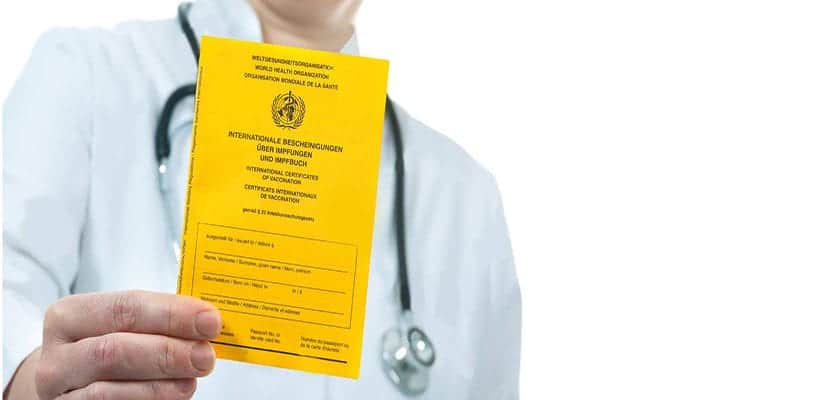
Whatever the reason for your trip, measures must always be taken to take care of our health. Especially when traveling to some exotic place abroad. In the following post, we echo what is the international vaccination certificate, what are the risk factors for the traveler, how much time in advance to wear them or what are the infectious diseases at risk, among other issues.
What is the international vaccination certificate?
Often also known as the international vaccination card, This certificate is a necessary document to travel outside our country that certifies that we have received a series of vaccines approved by the WHO (World Health Organization) in an international vaccination center authorized by the health authorities of our country.
The international vaccination certificate has a validity period of ten years counting from the tenth day after vaccination. And it has the same purpose as a normal vaccination card: to record the vaccines that have been administered to us. For this, the information contained in the certificate is available in several languages, usually Spanish, French and English, so that it is understandable to doctors or immigration agents regardless of the patient's nationality. The Spanish international vaccination certificate also has some information for travelers.

Image | Woman and Traveler
During the trip
In many destinations, the vaccination certificate can be essential to enter the country, so it is an essential document not only in the health field but also in the legal one to start a trip.
For example, in some places, not presenting the international vaccination certificate for diseases such as yellow fever may mean that the authorities will not allow us to pass.
The international vaccination certificate will be essential if, for example, during the trip we suffer an accident. Imagine that we are bitten by a monkey or a rat, the doctor who is going to treat us will need to know if we have the rabies vaccine and if so, how many doses have been administered so far.
What vaccines do I need to travel?
While we are preparing a trip to an exotic place, doubts assail us, what vaccines do I need? Which ones are mandatory? The best way to solve them is to use the website of the Ministry of Health in your country and find out or consult your family doctor.

How far in advance should they be?
It is best to plan vaccinations 4 or 6 weeks in advance as there are also vaccines that require a subsequent booster.
How many vaccination centers are there in Spain?
In Spain there are 101 International Vaccination Centers, 29 of which are in Foreign Health services under the Ministry of Public Administrations and the remaining 72 belong to other administrations. All of them functionally depend on the Ministry of Health.
What are the risk factors for the traveler?
- The destination of the trip: quality of medical care, water, accommodation, hygiene ...
- The duration of the trip: determines the probability of being exposed to bacteria and infections and influences the need for certain vaccinations.
- The purpose of the visit: rural areas carry more risks than areas adapted to tourism or business.

Classification of travelers according to risk
- Maximum risk: long-term trips or individual trips in precarious conditions.
- Moderate risk: trips of 1-3 weeks, with stays mainly in cities but with excursions to the countryside although, without sleeping outside hotels and without stays in precarious conditions.
- Minimal risk: business trips to large cities.
What are the infectious diseases at risk?
- Diseases transmitted by food and water: Cholera, Hepatitis A and E and Typhoid Fever.
- Vector-borne diseases: Malaria or Malaria, Yellow Fever and Dengue.
- Diseases transmitted by animals: Rabies and Viral Hemorrhagic Fevers.
- Sexually Transmitted Diseases: Hepatitis B, HIV / AIDS, Syphilis.
- Airborne Diseases: Flu and Tuberculosis.
- Soil-borne diseases: Tetanus.
Don't skimp on health
Abroad, it is common for the traveler to only have medical assistance in private hospitals, which is very expensive. In those areas where health care is scarce or not accessible, it is likely that the patient will need to be repatriated in the event of an accident or illness as well as if death occurs.
Therefore, it is advisable not to skimp on health and take out medical insurance with the highest possible coverage as well as request information on reciprocal agreements. that exist in health matters in the country of destination and residence